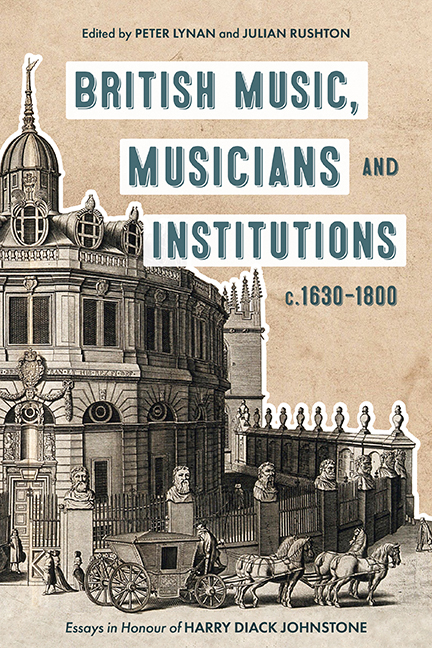Book contents
- Frontmatter
- Contents
- List of Illustrations
- List of Music Examples
- List of Contributors
- Acknowledgements
- List of Abbreviations
- Note to the Reader
- Introduction
- Part I Performers and Performance Style
- Part II Composers and Secular Institutions
- Part III Sacred Music and Institutions
- Part IV Dissemination: Copying, Printing, and Publishing
- Epilogue: Musica Britannica and the Eighteenth Century
- Harry Diack Johnstone: A Tribute
- Bibliography of the Publications of Harry Diack Johnstone
- Index
- Tabula Gratulatoria
8 - William Hayes (1708–1777), Professor of Music
Published online by Cambridge University Press: 06 October 2022
- Frontmatter
- Contents
- List of Illustrations
- List of Music Examples
- List of Contributors
- Acknowledgements
- List of Abbreviations
- Note to the Reader
- Introduction
- Part I Performers and Performance Style
- Part II Composers and Secular Institutions
- Part III Sacred Music and Institutions
- Part IV Dissemination: Copying, Printing, and Publishing
- Epilogue: Musica Britannica and the Eighteenth Century
- Harry Diack Johnstone: A Tribute
- Bibliography of the Publications of Harry Diack Johnstone
- Index
- Tabula Gratulatoria
Summary
Although he lived and worked outside London's cosmopolitan mainstream, William Hayes was an influential and well-rounded musician – organist, singer, conductor, and writer – who as a composer contributed to most major genres of his time. This chapter outlines his career at the University of Oxford and examines three large-scale works written for university occasions, illustrating the breadth of his ambition and the vitality and importance of Oxford's musical life.
Born in Gloucester in January 1708 and trained at the cathedral, Hayes took up his first post in 1729 as organist of St Mary’s, Shrewsbury. Two years later he moved to Worcester as cathedral organist. ‘But his Genius was not designed for so narrow a Sphere […] Oxford was the Place of all others he wished to settle in for the Remainder of his Life.’ He visited the city in July 1733 for Handel's concerts designed to revive interest in the university's summer Act Week ceremonies, and in the following year succeeded Thomas Hecht as organist and Informator Choristarum at Magdalen College. Hayes quickly established himself in university and city musical circles, receiving the degree of BMus on 8 July 1735 for his ode ‘When the fair consort’, and he attracted over 500 subscriptions for his maiden publication, the Twelve Arietts or Ballads, and Two Cantatas. His first important act at Magdalen was to oversee the installation of a new organ by Thomas Swarbrick, which he officially opened on St Cecilia's Day (22 November) 1736:
Last Monday, being St. Cecilia's Day, a new Organ was open’d at Magdalen College Oxford, where Mr. Purcell's Te Deum and abundance of the finest Church Musick, was perform’d: there were some of the best Performances on the German Flute, French Horn, and Violin from London; and the same Evening there was a concert of Musick in the College Hall, when the Masque of Acis and Galatea was perform’d to a very large Audience.
This performance of Acis and Galatea may have been part of Oxford's annual celebrations of St Cecilia's Day, records of which are sparse but include Hayes's Song for St Cecilia's Day (1742) and a performance of Handel's Samson for Hayes's benefit on 22 November 1743.
- Type
- Chapter
- Information
- British Music, Musicians and Institutions, c. 1630-1800Essays in Honour of Harry Diack Johnstone, pp. 143 - 164Publisher: Boydell & BrewerPrint publication year: 2022



